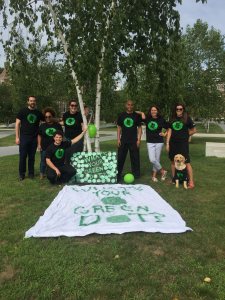Health Education
Health Education at Bates strives to empower students to engage with their well-being with a values-based, intentional, and harm-reduction lens. Bates recognizes that multidimensional, lifelong practices of health and well-being evolve around individuals, the communities they occupy, and the larger world. In our office, we aim to equip students with the knowledge and skills to think critically about their experiences to advance and inform positive wellness decisions that are right for them.
Health Education at Bates actively works to disrupt systems of power and oppression inherent in this field. Recognizing the influence of dominant narratives in shaping health systems throughout the world, we are committed to continuously interrogating the ways that these dynamics impact student experiences and understandings of well-being. Our mission is to promote holistic health and well-being of students and the community to ultimately thrive at Bates and beyond.
Peer Education: Community Advisors
Peer-based education and programming on health and well-being is carried out by Community Advisors, a group of student staff members in the Residence Life and Health Education Office. Supported by members of the Residence Life and Health Education professional team, CAs support peer well-being in three main ways: 1) peer advising for individuals and student residential communities; 2) programming tailored to specific communities in their residential settings; 3) one broad, all-campus programming week in each semester.
Students from all class years are invited apply to join the Residence Life staff each year. More information about this process can be found here.
Green Dot

Green Dot is a comprehensive, strategic, and research-based approach to violence prevention. Green Dot’s teachings, while primarily focused on eradicating power based personal violence, are applicable to everything from physical or sexual violence, to inappropriate language, dorm damage and more. It utilizes peer to peer influence to shift and change cultural expectations. Green Dot focuses on creating two new social norms:
- Violence will not be tolerated in this community.
- Everyone is expected to do their part.

Green Dot not only serves as a form of bystander intervention, but works to challenge and change cultural norms to prevent violence before it even occurs.
“Nobody has to do everything, but everyone has to do something”
At Bates, we offer 1-hour Green Dot Overviews during Orientation where every new Bates student learn about Green Dot and basic skills for recognizing and intervening in potentially harmful situations. We also offer 5-hour Green Dot Certification Trainings that allow students to further explore and apply their intervention skills as well as confront personal, peer and situational obstacles that may hinder their likelihood to intervene, even when they want to.
Healthy Bates 101 & 102
The Office of Health Education supports the First Year Experience mission, particularly as it pertains to promoting the value of health and wellness. Healthy Bates 101 is an interactive module sent to all matriculating students and invites students to consider their plans for the four years ahead. Healthy Bates 101 also includes important information and opportunities to practice skills for staying socially and emotionally healthy.
Following Healthy Bates 101, all first-year students will be invited to take Healthy Bates 102 at the start of their winter semester. Healthy Bates 102 references individualized responses from Healthy Bates 101, allowing students to reflect on personal goals and choices. Designed by students, for students, Healthy Bates 101 & 102 are the start of an important conversation about health and wellness that we invite you to continue throughout your time at Bates.
Liberating Structures and Health Education
In short term 2016, students embarked on a journey with Fisher Qua from Back Loop Consulting in a practitioner taught course. These students served as consultants for our office specifically focusing on health education programming at Bates. Much of their work involved designing activities and interviewing over 150 students about health on campus. Students delved into practice-based evidence, “bringing agility and innovation to [Student Affairs practices] through [course] development, design thinking, and Liberating Structures.” Students specifically focused on how to best develop a health program that supports meaningful engagement with health and wellness across a diverse student body.
Student Organization Partnerships
The Office of Residence Life and Health Education frequently partners with student organizations, including student staff within Residence Life. Students do great work, and the Office of Residence Life and Health Education loves to work together with students toward a common goal. Student organizations interested in working with the Office of Health Education can email healthed@bates.edu.